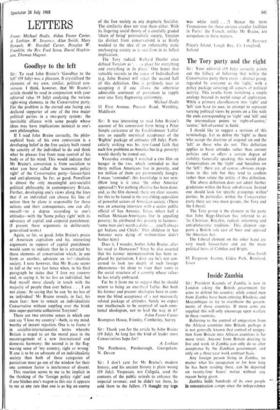Goodbye to the left
LETTERS
From: Michael Hudis, Aidan Foster Carter, 4. Lothian, W. Sweeney. Alan Smith, Mary Renault, W. Horsfall Carter, Douglas W. Franklin, the Rev Fred Sessa, David Hopkin- son, Thomas Magner.
Sir: To read John Braine's 'Goodbye to the left' (19 July) was a pleasure. It crystallised the elements of my own, similar, political con- version. I think, however, that Mr Braine's article should be read in conjunction with your editorial (also 19 July) analysing the various right-wing elements in the Conservative party. For the problem is the eternal one facing any declared supporter of one of the two major political parties in a two-party system: the inevitable alliance with some people whose ideas may have implications inimical to one's own philosophies.
If I read John Braine correctly, the philo- sophical basis of his own conversion is a developing belief in the free society built round the sanctity of the individual to do and think what he pleases free from state control of his body or of his mind. This would indicate that Mr Braine's conversion is from socialism to what you have called the 'economic policy right' of the Conservative party—laissez-faire and anti-planning. So far, so good. Powellism is almost the only meaningful anti-socialist political philosophy in contemporary Britain. Further, developing one's views along the lines that if an individual can choose his line of action then he alone is responsible for those actions and their consequences, one can ally oneself—to a degree according to one's attitudes—with the 'home policy right' with its advocacy of capital and corporal punishment. (I present these arguments in deliberately generalised terms.)
Again, so far, so good. John Braine's praise of American capitalism and his interesting arguments in support of capital punishment would seem to indicate that he is attracted by those elements of conservatism which, in one form or another, advocate an ind;vidualistic society. I note however, that Mr Braine seems to fall at the very last fence when, in his final paragraph he states that 'I love my country and, in saying it, be no less an individual, but find myself more closely in touch with the majority of people than ever before . . . I am not alone.' In saying that he can 'be no less of an individual' Mr Braine reveals, in fact, his main fear: how to remain an individualistic Conservative without toppling over the brink into super-patriotic collectivist Toryism?
There are two extreme senses in which one can say 'I love my country'—both, to my mind, worthy of instant rejection. One is to frame it in socialist-internationalist terms whereby Britain is urged to set the moral pace in the encouragement of a new international and domestic harmony; the second is in the flag- waving sense of 'my country, right or wrong.' If one is to be an advocate of an individualistic society then both of these categories of patriotism must go out of the window for their one common factor is intolerance of dissent.
This reaction seems to me to be implicit in the thinking of the 'foreign policy right' and if one-hitches one's wagon to this star it appears to me at any rate that one is as big an enemy of the free society as any dogmatic Socialist. The similarity does not stop there either. With its lingering social theory of a carefully graded 'chain of being' paternalistic society, Toryism (as distinct from conservatism) is as firmly wedded to the idea of an enforceably static unchanging society as is socialism in its fullest implication.
The Tory radical, Richard Oastler once defined Toryism as . . a place for everything and everything in its place.' One hopes that valuable recruits to the cause of Individualism (e.g. John Braine) will reject the second half of this definition. One is perilously near to accepting it if one allows the otherwise admirable sentiment of patriotism to topple over into Tory flagwaving uniformity.
Michael Hudis 11 First Avenue, Preston Road, Wembley, Middlesex






































 Previous page
Previous page